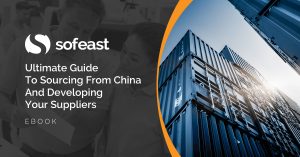
Some importers don’t have the expertise, or the time, to find and manage Asian manufacturing partners. They typically need help from an external sourcing agency to handle the tasks associated with China sourcing:
- Identifying, screening, and qualifying new suppliers;
- Help in developing new products/styles with suppliers;
- Ongoing management of the supplier relationships (communication, quality control, shipments follow-up).
Common mistakes when outsourcing China sourcing
What are the most common mistakes to avoid when evaluating sourcing agents and working with them?
1. Unreasonable expectations
Even the best sourcing agency will have a hard time getting you low prices, on-time shipments, and consistently great quality. If someone promises this to you, you are not talking to a professional.
Know what is most important to you, and plan accordingly. For example, if you absolutely need on-time and high-quality products, then you cannot work with the cheapest manufacturers on the market.
2. Not clarifying the sourcing agency’s responsibility
Let’s say you work with a third-party service provider that takes care of the sourcing/production side of your business. What guarantee do they offer in case a supplier scams you? If shipments are behind schedule? And if you receive junk product in your warehouse?
Will they at least pay some of their fees back to you? Do you have a contract with them?
3. Failing to consider the agent’s geographical presence
If you purchase products that are mostly made in Jiangsu province, don’t work with an agent who is only present in Guangdong. How often will he have face-to-face contact with suppliers (no to mention controlling product quality)?
This is the problem with individual agents: they generally know only one industry in one area.
4. Assuming that they follow a rigorous process
When you evaluate sourcing agencies, try to understand how they work. Request to see their order management system (if any). Even better, ask for examples of factory visit reports, product QC checklists, and QC reports.
If the agent is more disorganized than the manufacturer, he will give you new headaches.
5. Accepting an inappropriate compensation structure
Giving a commission to a sourcing company is very common. Finding and managing a good supplier it is a lot of work. But, if you keep re-ordering the same products from the same sources, you will probably pay more than you should.
Another option, which better reflects the agent’s work, is to pay a flat fee for each job: identifying and screening suppliers; following each new product development; managing each order’s production & shipment.
6. Insisting on going “factory direct”
If a sourcing agent is watching for your interests on the ground, you should try to purchase directly from a manufacturer, right?
Well, not always. If you import small quantities, large manufacturers will seldom be interested in your business. And trading companies might be the right solution to place production in smaller workshops.
7. Not checking the market price by yourself
How do you get an idea of the market price for a given product? You simply (1) request quotes from 10 companies listed on globalsources.com, (2) eliminate outliers, and (3) calculate the average price.
If the supplier’s price is above the market price, your agent might get a hidden commission. Even the multi-billion dollar “contract manufacturers” play this game when they sell to mega-retailers, so it can happen to you as well.
8. Not asking for reporting on production status & quality
A sourcing agency should work for you, the buyer. You should be briefed every time your agent visits your manufacturers.
- If they only report on production status when a shipment is delayed, you should ask for regular updates on every production run.
- If they fail to notice some quality issues, you should request them to appoint a professional third-party inspector (at least for final random inspections). And you should be in CC of the report.
9. Micromanaging production yourself
Some importers ask a sourcing agency for help, but keep interfering. They show suppliers that they are the ones taking the decisions. Then what happens? Suppliers don’t listen to the sourcing agency anymore.
Make sure that your sourcing partner is involved in all decisions (you pay for their professional advice, right?), and that your suppliers know that.
10. Relying too much on a third party
What happens if your sourcing agency goes out of business? Or if they re-negotiate the deal and they want you to buy from them? You should be prepared for these situations.
Don’t get locked into a relationship with an agent. You need to know the main actors in your supply chain and you should get regular reporting on the situation on the ground.
————————
Related reading on the topic of sourcing from China:
- The 3 types of sourcing companies in China
- The dirty little secrets of Chinese trading companies
- You might also like our DIY Sourcing from China Series of podcast episodes over on Sofeast
Ultimate Guide To Sourcing From China And Developing Your Suppliers [eBook]
This FREE eBook starts from the beginning, discussing whether you need to hire a sourcing agent, and follows the sourcing process right through to developing a trusted supplier’s quality and productivity.
There are 15 chapters over 80+ pages to explore, providing exhaustive guidance on the entire sourcing and supplier development process from start to finish, including:
- Identifying suppliers,
- Negotiations,
- Quality inspections,
- Developing Chinese suppliers,
- Improving factory quality and productivity,
- and much more…


Renaud,
Well said! Agents can be an effective channel, or it can be a total waste of your time. Here are some points I suggest on how to select the right agent:
Are they a legitimate company with proper business licensing?
Do they have a clear track record of performance? If they can’t give you some client references, run away. That is a very big red flag.
Do they have their own infrastructure or do they leverage another company’s staff, skills sets, office space, licensing and/or manufacturing.
Are they focused on a certain set of services or do they try to everything for everybody? Yes, even the 3rd party service providers have been known to outsource to others just like some factories outsource production without telling the buyer.
Is their pricing structure and service agreement well defined and transparent? It is a major pitfall to do business with a 3rd Party service provider without a clear contract in place that outlines the service, costs, time frame and other desired attributes of the partnership.
Thanks Mike. You are right, due diligence is a must when choosing a sourcing agent.
Seems the author learnt a lot in the China markets.. 🙂
Good work! but sometimes a little bit over it..
Hi Renaud,
Good work.The points you have mentioned above are very effective. Thanks for sharing your knowledge.
My favorite one is Not clarifying all the open points before starting any business. thanks.
Thanks Jake!